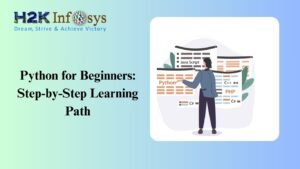Introduction
The need for organizations to adapt quickly to market changes and customer demands has led to the widespread adoption of Agile methodologies. These methodologies are designed to improve project efficiency, ensure flexibility, and promote team collaboration. As companies shift towards Agile methodologies, they rely on various frameworks to guide their processes, and among them, Agile Scrum has emerged as the most popular approach for managing projects. However, there are several other methodologies, each suited for specific types of teams and projects.
In this blog, we’ll explore the best Agile methodologies for 2025, their advantages, and how professionals can leverage certifications like Agile Scrum Master Certification and Agile Project Management Certification to stay competitive in the ever-evolving world of project management.
What is Agile?
From the English meaning we are all conversant about, Agile means to be active or hyper in an activity. Agile in software development refers to a complete set of methodologies used in software development for optimization. It is also imperative to know that Agile isn’t a tool used in the development process. Now, we can conclude that programmers use Agile methodologies to effectively develop software and deliver it in a quicker and more optimized way. Now, programmers are enrolling for the Agile certification online courses to get accustomed to this methodology.

There are different methodologies. Delving slightly to the benefits, Agile methodologies has proven to be one of the best in the field. Asides from the faster delivery feature it gives, Agile methodologies presents the processes in a transparent way. The software development process can be pretty overwhelming when there is a failure. However, it even becomes more complicated when the faulty area is not found. Now to the methodologies.
The Agile methodology has revolutionized the way teams manage and execute projects. It focuses on flexibility, collaboration, and delivering customer value in short, iterative cycles. As we approach 2025, Agile methodologies practices continue to evolve, incorporating new technologies, strategies, and frameworks that make project management even more effective. This blog post will dive into the best Agile methodologies in 2025, with a special focus on Agile Scrum and its various frameworks. We will also discuss how obtaining an Agile Project Management Certification can enhance your career prospects.
Why Agile Methodologies Matter in 2025
As businesses strive to remain competitive and responsive to customer needs, adopting Agile methodologies has become increasingly important. By promoting iterative progress, collaborative teams, and continuous feedback, Agile methodologies enables companies to deliver high-quality products faster and with better customer satisfaction. It ensures that projects remain flexible, accommodating changes that may arise during development.
The Scrum Master Certification and Project Management Certification are essential for professionals looking to enhance their expertise in managing this projects. These certifications not only validate your skills but also give you the tools to lead teams effectively and ensure that principles are correctly implemented in your projects.
Top Agile Methodologies in 2025
Agile Scrum
In Agile methodologies Scrum remains the most widely adopted this methodology, and its popularity shows no signs of waning as we approach 2025. Scrum is based on short development cycles called sprints, with each sprint producing a potentially shippable product increment. Scrum places a strong emphasis on team collaboration, clear roles, and regular ceremonies such as daily standups, sprint reviews, and retrospectives.
Key Benefits:
- Enhanced Collaboration: Daily Scrum meetings foster open communication among team members.
- Frequent Deliverables: Scrum ensures that there is a working product at the end of each sprint, providing quick feedback and adjustments.
- Flexibility: Teams can adapt the product based on client feedback during each sprint.
Agile Scrum Master Certification is crucial for individuals looking to lead Scrum teams and manage projects effectively. It teaches you to facilitate Scrum ceremonies, remove obstacles, and support the Scrum team in delivering value.
Kanban
Kanban is another methodology that emphasizes continuous delivery. Unlike Scrum, which focuses on sprints, Kanban is all about managing the flow of work through a visual board, limiting work in progress (WIP), and ensuring that tasks are completed before new ones are started.
Key Benefits:
- Continuous Delivery: Kanban ensures that work is continuously delivered, making it ideal for projects that require frequent releases.
- Increased Visibility: The visual Kanban board helps teams see what needs attention at a glance.
- Reduced Waste: By limiting WIP, teams avoid overloading themselves with tasks, leading to a more efficient process.
Kanban is particularly beneficial for teams that have ongoing work but want to reduce bottlenecks and improve process flow. It’s widely used in IT operations, software development, and customer support teams.
Lean Software Development
Lean Software Development is based on Lean manufacturing principles, aiming to improve efficiency and reduce waste. It focuses on optimizing value delivery by eliminating non-essential activities and reducing cycle times.

Key Benefits:
- Value Stream Mapping: Lean helps teams focus on value-adding activities and eliminate inefficiencies.
- Faster Delivery: Lean principles encourage teams to deliver value faster by focusing on essential work.
- Continuous Improvement: Lean emphasizes regular reviews and improvements to the process.
Lean Software Development works well for teams that have the ability to make quick adjustments and those that prioritize customer value. It is an excellent methodology for companies looking to improve productivity and deliver value quickly.
Extreme Programming (XP)
Extreme Programming (XP) focuses on improving software quality through continuous feedback, rapid releases, and collaboration between developers and customers. It emphasizes technical excellence and the importance of delivering high-quality code.
Key Benefits:
- Improved Code Quality: XP practices like pair programming, test-driven development (TDD), and continuous integration ensure the delivery of high-quality software.
- Customer Collaboration: Frequent iterations allow customers to provide regular feedback on the product.
- Flexibility: XP allows developers to adapt to changing requirements throughout the development process.
XP is particularly suitable for software development teams that need to deliver high-quality software quickly and are comfortable with frequent feedback and changes in requirements.
Crystal Methodology
Crystal is an Agile methodologies framework that focuses on the people involved in the project rather than just the process. It emphasizes team collaboration, communication, and flexibility while adjusting processes to the project’s size and criticality.
Key Benefits:
- Focus on People: Crystal recognizes the importance of team dynamics and customizes processes to fit the team.
- Adaptable: The framework can be tailored to different project types and team sizes.
- Frequent Releases: Like other Agile methodologies, Crystal encourages frequent deliveries and iterations.
Crystal is best suited for small to medium-sized teams and projects that require high levels of collaboration and flexibility. It is particularly useful in situations where team interactions and communication are vital to success.
Feature-Driven Development (FDD)
Feature-Driven Development (FDD) focuses on delivering small, client-valued features within short iterations. It emphasizes creating a high-level model of the system and then implementing features in a feature-driven manner. FDD places a strong emphasis on delivering tangible results to clients early in the development process. The methodology begins with the development of an overall model of the system, which is then broken down into distinct features. These features are small, client-valued, and prioritized based on business needs, allowing teams to focus on delivering high-priority functionalities first.
FDD’s approach offers several advantages, particularly for large-scale projects and teams. Since each feature is developed independently, FDD allows for parallel workstreams, which can significantly speed up the overall development process. Teams work on features one at a time, with each iteration providing a shippable, client-ready product. This focus on incremental delivery ensures that clients can see progress quickly, making it easier for them to provide feedback and guide development.
Key Benefits:
- Client-Focused: FDD keeps client needs at the forefront by delivering features that bring immediate value.
- Predictability: With well-defined features, teams can more accurately estimate timelines and progress.
- Scalability: FDD works well for large teams or organizations, as it focuses on individual features that can be broken down into smaller tasks.
FDD is a good choice for large-scale projects where clear, actionable features need to be delivered frequently. It works best in environments where client satisfaction and deliverable features are the main focus.
Why Choose an Agile Scrum Master Certification?
Agile Scrum Master Certification is a valuable credential for professionals looking to take leadership roles in this projects. By earning this certification, you can gain expertise in managing Scrum teams, leading successful sprints, and ensuring that practices are effectively followed.

Key advantages of obtaining Agile Scrum Master Certification:
- Increased Job Opportunities: With many organizations adopting this practices, there is a growing demand for certified Scrum Masters.
- Better Project Outcomes: Scrum Masters help ensure that teams are focused, efficient, and collaborative, which directly impacts project success.
- Career Advancement: Certification enhances your credibility and can open doors to leadership positions in Agile teams.
Conclusion: Prepare for the Future of Agile
As we approach 2025, Agile methodologies will continue to evolve, and teams will rely on various frameworks to meet the unique demands of their projects. Agile Scrum, Kanban, Lean Software Development, XP, Crystal, and FDD are all effective methodologies that promote efficiency, collaboration, and flexibility.
To stay ahead in the competitive job market, consider pursuing an Agile Project Management Certification. These certifications will equip you with the tools and knowledge needed to lead Agile projects successfully and ensure that your team delivers value to clients consistently.
Start your journey toward Agile mastery by enrolling in H2K Infosys’ comprehensive Agile Scrum Master Certification course. Get hands-on experience, learn from industry experts, and advance your career with H2K Infosys.




























